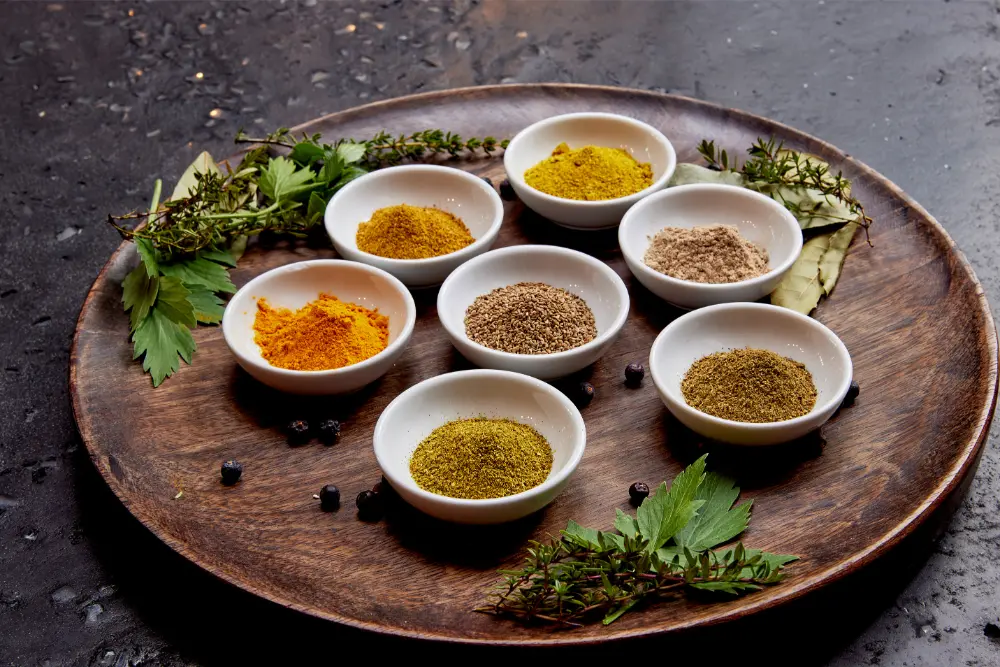Imagine if you could not only add variety to your cooking with a simple remedy, but also nourish your body, mind and soul and even keep them strong. Ayurvedic herbs and spices allow you to do just that. Because in Ayurveda, herbs are far more than just a flavouring ingredient in food.
According to Ayurvedic health teachings, every plant has certain powers and properties that you can utilise specifically for yourself. Be it to start the day fresh and full of energy, to stay healthy despite wind, weather and colds or to help you lose weight in a natural way.
Why is it worth integrating Ayurvedic herbs and spices into everyday life?
Herbs and spices play a much more important role in the culture of the Indian subcontinent than we are used to in the western world. In Ayurvedic cuisine, they not only serve as aromatic flavour enhancers that give the colourful curries their exotic aroma, but also as natural tonics.
In a type-appropriate Ayurvedic diet, herbs and spices are not only used when we are ill, but are also integrated into our everyday diet as a preventative measure.
To support your immune system and well-being in the long term with Ayurveda, you should focus on healthy routines. This will give you a strong immune system that gives stress, viruses and bacteria much less of a chance.
Essential spices and herbs for well-being and the immune system
According to Ayurveda, there are a large number of herbs and spices that are particularly beneficial and invigorating. We would like to introduce you to four important representatives from this large selection that are well suited to Vata, Pitta and Kapha.
– Ginger
– Turmeric
– Cardamon
– Ashwagandha
Ginger – a warming Ayurvedic spice
The spicy root is also known here for its warming properties. From an Ayurvedic perspective, ginger also has the ability to stimulate our metabolism and our digestive fire (agni).
Vata or Kapha types in particular can benefit from this effect. Despite its warming properties, the fresh root is also well tolerated by the hot Pitta dosha.
Turmeric as a versatile spice
Turmeric, also known as turmeric, is also an all-rounder that is valued in Ayurvedic nutrition for its effects on digestion and inflammation and its antioxidant effect. These positive effects make turmeric a powerful ally against viruses and bacteria.
At the same time, the carotenoids it contains ensure a beautiful complexion. However, make sure you always take turmeric with freshly ground black pepper. Black pepper improves the absorption of nutrients.
Soothing cardamom
Cardamom is one of the most valuable and oldest spices in the world. In Ayurveda, it has both digestion-stimulating and calming properties. These can have a positive effect not only on your stomach, but also on your general well-being. Cardamom can also influence the absorption of nutrients from food.
Ashwagandha for inner peace
Ashwagandha is one of your best companions in stressful everyday working and private life. This is because the herb is said to have a stress-relieving and adaptogenic effect, which can help you to calm down better in the evening and concentrate more easily on your tasks during the day. Make sure you always take ashwagandha in the evening!
How can you use these herbs and spices in everyday life?
Integrating these powerful herbs and spices into your everyday life is much easier than you might think. First of all, they are great for cooked dishes such as curries, soups or stews. But they can also be used to full effect in your morning porridge.
Particularly in the colder months, when the vata dosha is particularly active, you should increasingly rely on warming spices such as ginger and black pepper. These help to support your digestive fire and mobilise your immune system.
Get started with ginger in the morning
Instead of the store-bought ginger shot, which usually contains unnecessary sugar and preservatives, we recommend warm water with a splash of lemon juice and a pinch of ginger in the morning. You can simply use dried ginger powder or grate fresh ginger.
If you pour hot water into a vacuum flask and add as finely chopped ginger as possible, you can also do your metabolism good throughout the day.
Moon milk and golden milk – supporting the immune system with pleasure
Another simple health recipe from Ayurveda is the preparation of golden milk. This drink, consisting of warm milk, ginger, turmeric, black pepper and ginger, is not only a delicious ritual, but also an effective way to support the immune system.
However, it is better not to drink the golden milk too late in the day, as the spices have a strong activating effect and could keep you awake.
In the evening, however, it is better to opt for a calming moon milk with ashwagandha powder.
By incorporating these simple Ayurvedic principles into your daily routine, you will not only maintain a strong immune system, but also support your overall well-being. You can find even more delicious Ayurvedic recipes in our Ayurveda cookbook.




